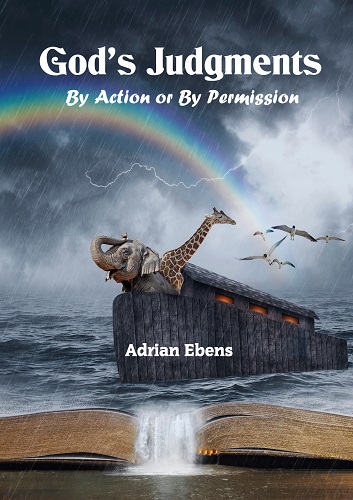15. Applying the Trinitarian Premise
Here is our premise and underlying assumption again:
Premise: There are three Persons in the Godhead.
Hidden/Underlying Assumption: Position of Divinity is only ascribed to beings of highest inherent power.
Let’s apply this premise to the problematic passages of Scripture.
Deu 6:4 Hear, O Israel: The LORD our God is one LORD:
Because we have clearly proved there are three Persons of the Godhead based on the premise I would suggest the following. The Lord (Singular) our God (Plural) is One (Singular) Lord. The plural indicates the trinity and the word one “Echad” is the same word used as for Adam and Eve being one flesh. So this text is indicating that there are three beings who are one in purpose and fellowship.
Prov 8:22-30 The LORD possessed me in the beginning of his way, before his works of old. I was set up from everlasting, from the beginning, or ever the earth was. When there were no depths, I was brought forth; when there were no fountains abounding with water. Before the mountains were settled, before the hills was I brought forth: While as yet he had not made the earth, nor the fields, nor the highest part of the dust of the world. When he prepared the heavens, I was there: when he set a compass upon the face of the depth: When he established the clouds above: when he strengthened the fountains of the deep: When he gave to the sea his decree, that the waters should not pass his commandment: when he appointed the foundations of the earth: Then I was by him, as one brought up with him: and I was daily his delight, rejoicing always before him;
This passage refers to wisdom (Prov 8:1). Some people combine this passage with 1 Cor 1:24,30 where Paul refers to Christ as Wisdom. Based on our premise that there are three Persons of the Godhead, applying this passage to Christ would appear to make Him inferior to the Father. So this passage must be restricted to simply the personification of wisdom.
Joh 3:16 For God so loved the world, that he gave his only begotten Son, that whosoever believeth in him should not perish, but have everlasting life.
The word begotten (birth, begat) is limited to when Jesus was incarnated as a human being. The word begat can also be used to mean unique or one and only rather than born or begat.
Joh 5:19 Then answered Jesus and said unto them, Verily, verily, I say unto you, The Son can do nothing of himself, but what he seeth the Father do: for what things soever he doeth, these also doeth the Son likewise.
Since Jesus is the second person of the Godhead and equal with the Father, this passage cannot apply to the time before Christ came as a man. Christ has power to do whatever He wishes but He chooses to use His power in conjunction with the Father. When He came to earth He determined not to use His own power but His Father’s power to be an example to all mankind.
Here is another view on this by Adam Clarke: “The Son can do nothing of himself - Because of his inseparable union with the Father: nor can the Father do any thing of himself, because of his infinite unity with the Son.”[1]
Joh 5:26 For as the Father hath life in himself; so hath he given to the Son to have life in himself;
Since Jesus is equal with the Father this cannot be a blanket statement regarding the person of Christ. Christ has in Himself life original, unborrowed and underived. He is the mighty God, the everlasting Father, the prince of peace. This statement must be referring to His work as Messiah, the actual use of the Father’s life to work miracles, teach etc.
Joh 8:42 Jesus said unto them, If God were your Father, ye would love me: for I proceeded forth and came from God; neither came I of myself, but he sent me.
Joh 15:26 But when the Comforter is come, whom I will send unto you from the Father, even the Spirit of truth, which proceedeth from the Father, he shall testify of me:
The word proceed can mean ‘come out of’. Again, if we infer Christ came out of the Father at some point, then we make Him inferior to the Father and therefore not Divine. So proceeded simply means proceeded forth from the heavenly presence of the Father.
Joh 14:16-18 And I will pray the Father, and he shall give you another Comforter, that he may abide with you for ever; Even the Spirit of truth; whom the world cannot receive, because it seeth him not, neither knoweth him: but ye know him; for he dwelleth with you, and shall be in you. I will not leave you comfortless: I will come to you.
On the basis of our premise, the word another must be speaking of another separate person – the Holy Spirit. When Jesus says He will not leave us comfortless, He is saying He will send the Holy Spirit as His representative and the Holy Spirit as a separate Person brings the Person of Christ to us. If we favour an Athanasian creed-based view as Pr Max Hatton[2] does for example, then since Father, Son and Spirit are three Persons in one substance, the Spirit can easily represent the Son because He is part of the same substance. If we take the more common Adventist approach – three separate Beings who are one in purpose and fellowship as defended in Vance Ferrell’s – Defending the Godhead,[3] the Spirit represents Christ because He knows Him so well and can reflect the person of Christ.
Gal 1:3 Grace be to you and peace from God the Father, and from our Lord Jesus Christ,
Since we know there are three Persons, this statement is reflecting the source of grace: from the Father and Son. It must be clearly evident that such grace comes to us through the Spirit. This is apparently so obvious that Paul does not need to mention it.
1Co 8:6 But to us there is but one God, the Father, of whom are all things, and we in him; and one Lord Jesus Christ, by whom are all things, and we by him.
Since we know there are three equal Persons, this statement simply reflects the roles of the Father and the Son in the plan of salvation. The Father acts as the source and the Son acts as the channel. These roles are the work of Father and Son but this does not reflect the Person of Father and Son in their equality.
1Co 15:28 And when all things shall be subdued unto him, then shall the Son also himself be subject unto him that put all things under him, that God may be all in all.
Here is what Adam Clarke comments on this passage: “The Son also himself be subject - When the administration of the kingdom of grace is finally closed; when there shall be no longer any state of probation, and consequently no longer need of a distinction between the kingdom of grace and the kingdom of glory; then the Son, as being man and Messiah, shall cease to exercise any distinct dominion and God be all in all: there remaining no longer any distinction in the Persons of the glorious Trinity, as acting any distinct or separate parts in either the kingdom of grace, or the kingdom of glory, and so the one infinite essence shall appear undivided and eternal. And yet, as there appears to be a personality essentially in the infinite Godhead, that personality must exist eternally; but how this shall be we can neither tell nor know till that time comes in which we shall See Him as He Is. 1Jo_3:2.” [4]
This view obviously reflects three Persons in one substance who only divided for the plan of salvation. When the plan of salvation is finished, then there will be no more separate roles and it will be only one substance again. Jesus will no longer exist as a separate Being.
The Adventist commentary reflects the ‘three Beings in unity’ concept. “In the Divine plan for the redemption of the world the Father committed everything into the hands of the Son (see on Matt. 11:27; Col. 1:19). When Christ’s mission is completed and the enemies of God subdued, then the Son will deliver “up the kingdom to God, even the Father” (1 Cor. 15:24). This act implies no inferiority of the Son compared with the Father. It is a demonstration of the unity of purpose among the members of the Godhead, whereby the activities of one are seen to be but the carrying out of the united will.”
In essence this appears to be saying that Christ will maintain a subordinated role throughout eternity even though they both possess equal power.
Heb 1:1-4 God, who at sundry times and in divers manners spake in time past unto the fathers by the prophets, Hath in these last days spoken unto us by his Son, whom he hath appointed heir of all things, by whom also he made the worlds; Who being the brightness of his glory, and the express image of his Person, and upholding all things by the word of his power, when he had by himself purged our sins, sat down on the right hand of the Majesty on high; Being made so much better than the angels, as he hath by inheritance obtained a more excellent name than they.
With reference to the concept of inheritance the Adventist Bible Commentary says briefly “By inheritance. Christ has been "appointed heir of all things" (see on v. 2). With this inheritance He was also given "a name which is above every name"”.
The inheritance here is perceived through the appointment or role taking. So it is a symbolic inheritance rather than a literal inheritance.
In summary, when we encounter problematic texts, they apply to one of the following situations:
- They apply only to the incarnation of Christ in this world.
- They are a literary device as in the case of the personification of wisdom.
- They are symbolic in nature.
- They apply to roles rather than the actual Person of the Godhead mentioned.
Let us have a look at some of the Ellen G White Statements that are problematic.
“The Sovereign of the universe was not alone in His work of beneficence. He had an associate--a co-worker who could appreciate His purposes, and could share His joy in giving happiness to created beings. "In the beginning was the Word, and the Word was with God, and the Word was God. The same was in the beginning with God." John 1:1, 2. Christ, the Word, the only begotten of God, was one with the eternal Father--one in nature, in character, in purpose--the only being that could enter into all the counsels and purposes of God. "His name shall be called Wonderful, Counselor, The mighty God, The everlasting Father, The Prince of Peace." Isaiah 9:6. His "goings forth have been from of old, from everlasting." Micah 5:2. And the Son of God declares concerning Himself: "The Lord possessed Me in the beginning of His way, before His works of old. I was set up from everlasting. . . . When He appointed the foundations of the earth: then I was by Him, as one brought up with Him: and I was daily His delight, rejoicing always before Him." Proverbs 8:22-30.” PP 34
This paragraph presents Christ as the following:
- As begotten before His incarnation.
- As the only Being that could enter into the purposes of God.
- That Christ is described in Prov 8:22-30 and therefore was set up from everlasting.
Personally at this point I find it quite hard to answer this paragraph and maintain the premise with its underlying assumption. There are some possibilities that have been suggested such as Christ was the only Person who could enter into the purposes of God because the Holy Spirit operates on a different level and also was not visible to the angels. Suggestions have also been made that Ellen White has grown in her understanding of the Trinity and her later statements are a lot clearer while earlier statements are less specific; but this idea opens the door to choosing what statements of inspiration you want to believe. Even so, this statement is very specific and the concept is repeated in several places.
At this point, if you accept the writings of Ellen White on face value you should be faced with a serious dilemma. Personally, this dilemma was so great for me that it has taken 14 years to begin to come to terms with it. If I begin to open my mind to the possibility that the three Persons of the Godhead are not equal in the sense of a Trinity then a number of emotional barriers immediately confront me. I could face isolation from my friends, or “I could be faced with removal from the church.” These emotional realities can place incredible stress upon a person’s mind especially for someone who has been a part of the church all their life. So there has to be an answer but we just can’t see it, so we leave it unanswered and just keep applying the premise and find other passages to reinforce our thinking. I have heard many people simply respond “there are too many three’s statements” or “it’s a mystery” or “why are you focusing on this, we have to get the message out, you are just causing confusion with these questions” or simply quote a passage like this:
“Christ is the pre-existent, self-existent Son of God.... In speaking of his pre-existence, Christ carries the mind back through dateless ages. He assures us that there never was a time when He was not in close fellowship with the eternal God. He to whose voice the Jews were then listening had been with God as one brought up with Him.--Signs of the Times, Aug. 29, 1900. He was equal with God, infinite and omnipotent. . . . He is the eternal, self-existent Son. --Manuscript 101, 1897.” Ev 615.3
Placing these two statements side by side, based on our premise with its underlying assumption, it will be impossible to the candid mind to harmonize them. We must either re-examine the foundation of the premise or simply wait for God to reveal the unresolved contradictions.
Let us look at a few more statements from EGW.
“To dispute the supremacy of the Son of God, thus impeaching the wisdom and love of the Creator, had become the purpose of this prince of angels. To this object he was about to bend the energies of that master mind, which, next to Christ's, was first among the hosts of God.” PP 36
Ellen White makes this comment in a few places that Lucifer was next in honour to Christ. The only way to make sense of that in terms of the Godhead is to assume that the angels did not know about the Holy Spirit or that he acted in a separate line of command. This is possible but it makes one wonder why did Ellen White make such problematic statements?
Let us look at another statement.
“In these words is set forth the great principle which is the law of life for the universe. All things Christ received from God, but He took to give. So in the heavenly courts, in His ministry for all created beings: through the beloved Son, the Father's life flows out to all; through the Son it returns, in praise and joyous service, a tide of love, to the great Source of all. And thus through Christ the circuit of beneficence is complete, representing the character of the great Giver, the law of life.” DA 21
Ellen White explains that life flows out of the Father, through the Son, out to the universe and then returns through Christ to the Father. She states it is the law of life for the universe. Why is this the law for the universe? Why does she not say the law for this world because of the plan of salvation? Why is it all created beings and not just human beings? If God is a Trinity, then is he portraying himself in the roles of Father, Son and Spirit to all created beings and not just to humanity? And if so why? Why do unfallen beings need to receive life through Christ in the same way that fallen beings do? We might answer that, this is just the way they decided to do it, but nonetheless it is an interesting passage if we are willing to really engage it.
Finally let’s look at this passage:
“Cumbered with humanity, Christ could not be in every place personally; therefore it was altogether for their advantage that He should leave them, go to His father, and send the Holy Spirit to be His successor on earth. The Holy Spirit is Himself divested of the personality of humanity and independent thereof. He would represent Himself as present in all places by His Holy Spirit, as the Omnipresent.” 14 MR 23.
The most important section of this statement is:
“The Holy Spirit is Himself divested of the personality of humanity”
Who is the Himself, is it Christ or the Holy Spirit? Does it make sense to say that the Holy Spirit is divested of the personality of humanity? How can He be divested of something He never possessed? Only Christ possessed humanity and only Christ could possibly be divested of it. If we say the Himself is the Holy Spirit, then the passage does not really make sense. If we say that it is Christ then it is stating that the Holy Spirit is simply Christ in a different form. But this would completely destroy the premise of the Trinity. This statement leaves no option but to question our underlying premise. This only makes sense, as every statement and assumption we embrace must harmonise with Scripture and the Spirit of Prophecy. Let us look at the premise again.
Premise: There are three Persons of the Godhead.
Hidden/Underlying Assumption: Position of Divinity is only ascribed to beings of highest inherent power.
I believe that we can say that our premise is true but without testing the underlying assumption by Scripture we cannot say it conclusively and we are in danger of building on the sand. It is a partial conclusion. From the above statements, there must be a high degree of uncertainty with our underlying assumption. So at this stage we have the following.
Premise: There are three Persons of the Godhead (Partially True).
Hidden/Underlying Assumption: Position of Divinity is only ascribed to beings of highest inherent power (Uncertain).
[1] Adam Clarke Bible Commentary used from E-sword.
[2] Max Hatton, Understanding the Trinity, Autumn House, Alma Park, Grantham, England, 2001.
[3] Vance Ferrell, Defending the Godhead, Harvestime Books, Altamont, Tennessee, USA, 2005.
[4] Adam Clarke Bible Commentary found on E-Sword





